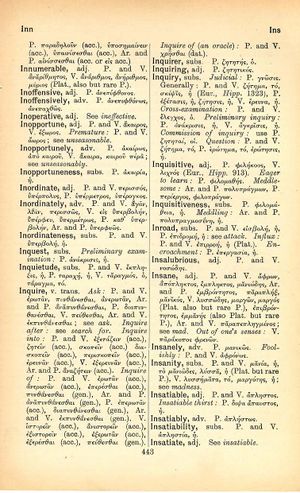insane
ἔστιν οὖν τραγῳδία μίμησις πράξεως σπουδαίας καὶ τελείας μέγεθος ἐχούσης, ἡδυσμένῳ λόγῳ χωρὶς ἑκάστου τῶν εἰδῶν ἐν τοῖς μορίοις, δρώντων καὶ οὐ δι' ἀπαγγελίας, δι' ἐλέου καὶ φόβου περαίνουσα τὴν τῶν τοιούτων παθημάτων κάθαρσιν → Tragedy is, then, a representation of an action that is heroic and complete and of a certain magnitude—by means of language enriched with all kinds of ornament, each used separately in the different parts of the play: it represents men in action and does not use narrative, and through pity and fear it effects relief to these and similar emotions.
English > Greek (Woodhouse)
adj.
P. and V. ἄφρων, ἀπόπληκτος, ἔμπληκτος, μανιώδης, Ar. and P. ἐμβρόντητος, παραπλήξ, μανικός, V. λυσσώδης, μαργῶν, μαργός (Plat. also but rare P.), ἐπιβρόντητος, ἐμμανής (also Plat. but rare P.), Ar. and V. παραπεπληγμένος; see mad. Out of one's senses: V. παράκοπος φρενῶν.
Latin > English (Lewis & Short)
insānē: adv., v. insanus.

